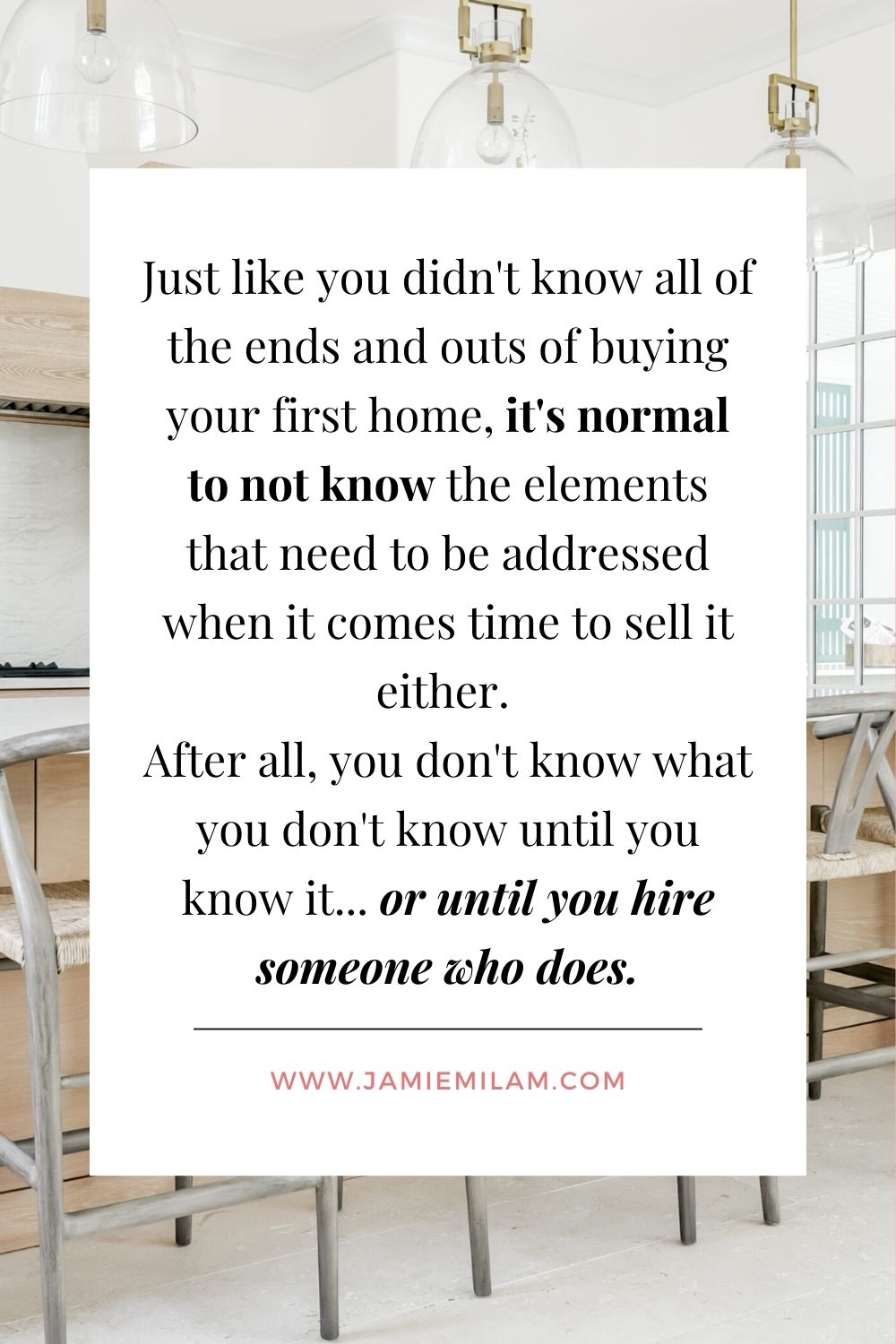THE BLOG
THE BLOG
*This website uses affiliate links which may earn a commission at no additional cost to you. As an Amazon addict and Associate, I earn from qualifying purchases, but I'm only recommending products I love!
Browse More Blog Posts:

Selling Your First Home
5 Things You May Not Know
Author: Jamie Milam, Realtor® and Certified Divorce Specialist®
Date: August 12, 2024
Selling your first home is an exciting journey that comes with its unique set of challenges and learning curves. Sure, HGTV makes it look easy, but there are lots of nuances (legally & logistically) that go along with it. Just like you likely didn't know all of the ends and outs of buying your first home, it's normal to not know the elements that need to be addressed when it comes time to sell it either. After all, you don't know what you don't know until you know it... or until you hire someone who does.
Even if you feel well-prepared and have partnered with a skilled real estate professional, there are several aspects of the home-selling process that might surprise you. Heck, even those of us who work in the industry every day still run into new surprises or situations occasionally. It's normal to feel like there's a lot to take in and consider - because there is. And your home is likely your biggest asset, so you certainly want to minimize your risk and maximize your potential for securing the best sales contract possible.
Here are five essential insights to help you navigate your first home sale effectively:
1. Pricing is Critical
Setting the right price for your home is crucial. Tempting as it may be to start with a high asking price, this can deter potential buyers and lead to a longer wait time in selling your home. Overpricing can cause your home to sit longer on the market and necessitate significant price drops later on, both of which will give buyers the impression that there's something wrong with the property. A competitively priced home, on the other hand, is more likely to attract interest and sell quickly.
Pricing isn't as simple as price per square foot. There are several adjustments made during an appraisal process. I often tell sellers that when it comes to pricing, my job is two part:
- Part historian - thinking like an appraiser and relying on comps so I can confidently defend your list price.
- Part fortune teller - relying on the current data, trends and buyer behavior to predict where buyers expect the home to be priced at.
It's important to know the market stats and trends in your local area and the direction they're heading to assist in making a decision on pricing. Your real estate advisor has industry tools that offer these insights and most certainly should be incorporating them as a part of your pricing strategy.

Other factors to consider:
- Your timeline: Factor in the time it'll take to get your home prepped for market (more on that in a moment) and how your best comps may be affected by that timeline. When considering the best comps, you have to pay close attention to their sale date. Being able to anticipate how long it'll take to get your home ready for market and how long your home may be on the market before a contract could be a factor if your best comp may soon become "too old" for the buyer's appraiser to use. Of course, your own ideal timeframe for making a move will also influence how aggressively you may want to price.
- Property condition: Thanks to HGTV, new construction model homes, and rising interest rates, buyers are more keen on pulling the trigger on homes that have less structural or cosmetic work needed. However, it may not be financially possible for you to make the necessary repairs or updates to attract the highest sales price as the comp home the road. Pricing your home well below what other homes with those completed repairs/updates have sold for will make it obvious to buyers that you are priced with that in mind.
- Offering cooperative compensation: Sellers aren't required to agree to offering cooperating compensation as a part of the fee they pay to their listing firm. In fact, listing fees are negotiable between you and the listing firm. Many listing agents base their total listing services fee with a cooperating
compensation amount factored in because we know that this offer is a big incentive for other firms to bring the most amount of buyers to your home as an effort to secure the best contract for you possible. Without that incentive, the buyers are left having to factor in their buyer agent service fee into their total closing costs as well - an amount most buyers (especially first-time homebuyers - you were one once too right?) just don't have out of pocket. So if you elect to not offer any cooperating compensation, you may want to consider lowering your list price to offset that amount to attract the most amount of buyers.
Pricing is a big part of the strategy to selling a home. There really is a science (and often a psychology!) to it. And remember, a list price isn't just about what you financially need to make your next move happen - it has to be supported by the market. Don't let your emotions be the driving force — conduct research, get the numbers, formulate a strategy and list your house accordingly.
2. Preparation is Key
Before listing your home, take proactive steps by addressing repairs and any deferred maintenance. This not only enhances the appeal of your home but also prevents potential buyers from being put off by the work they would need to do. As rising home prices swept the nation, rising interest rates soon followed. Both of these impact a buyer's affordability in today's market and their liquidity to do the repairs and/or upgrades themselves after closing. A well-maintained home generally sells faster and possibly for a higher price, as buyers perceive the care you've taken over time.
Tasks you shouldn't skip over when prepping your home for market:
- Prioritize structural repairs: If you or your agent have any structural concerns, get those inspected, and preferably addressed, prior to listing. Otherwise, they'll come up in the buyers' inspection if not and can create major concerns for them, potentially putting your contract at risk. Major defects in a home are a material fact that legally must be disclosed to any and all potential buyers. Taking the proactive approach of addressing them in advance or at least knowing what it will take to remedy them and sharing that information with the buyer can greatly help you in your negotiations strategy.
- Decluttering and staging: It's crucial that you create a space that buyers can visualize themselves living in with their belongings, not yours. "Staging" doesn't necessarily mean bringing in rented furniture, but it does differ from the way you design your home to live in. Decluttering involves carefully removing excess personal items and décor to create a clean and appealing space. To help with this process, I offer a staging consult to my sellers in which we go through each room with an interior designer, making notes of all of their suggestions to best position their home for marketing. You only get one chance at a first impression to entice buyers to tour your home and then you've really got to make it count once they are inside.
Don't underestimate the impact this will have on your overall marketing and selling strategy. There's a reason I tell my sellers that I work as a partner with them in getting their home sold - and that's because it's up to them to complete the tasks we've advised based on our experience in the market. Putting in the work on the prep side is the homeowners' job to help me best position it competitively; then my job is to get to work marketing the home and putting my negotiation and transaction skills in action for you.
3. Understanding Disclosure Practices
Transparency about your home's condition is generally expected in the home-selling process. And in many states, as it is in North & South Carolina where I practice, it's a legal requirement for an owner of residential real property to provide to a purchaser a completed and signed disclosure statement prior to forming a real estate purchase contract. Additionally, licensed agents are also legally required to disclose any known material facts regardless if the seller does or not on their disclosure form(s).
Sellers often share details about the property's history and current state, which can include past repairs and any existing conditions. Providing this information can foster trust and facilitate a smoother transaction by ensuring buyers are well-informed about what they are purchasing. It tends to attract a more confident contract because you've helped ease the buyers' concerns for the unknown. This approach is widely regarded as a best practice in real estate sales.
These disclosures are typically available for your state with a simple Google search for the phrase "{your state} real estate property disclosure form" where you can readily download them. Your real estate agent should also require these to be completed prior to marketing your home.
4. Anticipating Closing Costs
This is a common calculation that I too often see real estate agents fail to present to their seller at their initial listing appointment. It's always been my practice that it's the bottom line - the net proceeds - that a seller is most concerned about when selling their home, often because it's a big factor in making their next goal a reality too. To take it one step further, I find it best practice to present my sellers with two to three potential scenarios, depending on sales price. After all, true market value is what a seller is willing to sell for and what a buyer is willing to pay. While real estate professionals have a lot of tools and data to assist them in creating the best pricing strategy, we don't have the crystal ball or control over the buyers entirely.
Understanding potential closing costs is crucial when selling your home. These costs can vary and might include fees such as HOA transfer fees, prorated property taxes, state transfer taxes, professional service fees and other related expenses. It's important to be aware that these costs are part of the transaction and can sometimes be negotiated with the buyer. By familiarizing yourself with these potential expenses, you can better estimate the net proceeds from your home sale and approach negotiations with a more informed perspective.

5. Negotiations
Negotiating the sale terms is more complex than just agreeing on a price. As a first-time seller, it’s crucial to understand that nearly every aspect of the offer can be negotiated, including closing dates, contingencies, and even appliances included in the purchase contract.
But negotiations don't just end there.
While many states may include verbiage in their purchase contracts that the home is being sold in its current, "as-is" condition, the buyer still has a right to an inspection period to perform their due diligence in making their final decision to complete the sale by closing on the transfer of the property. As an effort to make it a win-win for both parties, they'll often make a request for some repairs to be performed or a credit to be provided as an alternative. Re-negotiating the price or terms of the contract is a common occurrence in a real estate transaction.
Having a flexible strategy and an experienced real estate agent on your side can significantly benefit this process. Your agent should be able to utilize their network of industry contacts, including inspectors, consultants, and contractors to ensure that you have enough reliable information to make an informed financial decision on how to best move forward.
Whether it's negotiating repair responsibilities or adjusting the closing timeline to fit your needs, being well-prepared to discuss these aspects can make a significant difference in achieving a favorable sale.
Navigating your first home sale can be daunting, but with the right information and guidance, you can successfully manage the transaction and look forward to your next steps in your real estate journey. Being informed about these key aspects will not only help you feel more confident but also position you for a successful and smooth sale. Remember, the best resource at your disposal is a knowledgeable real estate professional who can provide insights and expertise tailored to your specific situation.
If you are planning to sell your house, make sure to grab a copy of my free resource: How to Sell Homes Fast for Top Dollar. Not only does it cover more than fifteen common seller mistakes, but it also unlocks the formula that wealthy home sellers use to sell homes fast for more money, so you can implement the same strategy for your own benefit today.
Cheers to a successful selling strategy,


In this book, I break down what affluent home sellers do differently. I reveal their strategies, secrets, tips, and much more to help you sell your home.
Free Real Estate Book Reveals...
- Marketing Approaches
- Pricing Tips
- Negotiating Mistakes
- Selling Strategies
Save this post to come back to or share with a friend!

About Me
I'm Jamie Milam, a determined AF woman who's embraced life after divorce by finding peace through self-awareness, intentional decision-making, and thrilling new travel adventures.
As a Realtor® in Charlotte, NC (and your connection to top agents nationwide), I’m passionate about guiding you through your homeownership and design goals—while also helping you create space for the things you love. My mission is to empower you to create a life of alignment too - at home, abroad, and within.
Whether it’s through real estate tips, home design inspiration, or solo travel experiences for divorced, independent women, I hope this space encourages you to discover deeper self-awareness and build a life that aligns with your passions and needs.
Have you scoped the podcast series that empowers women to make aligned decisions in a divorce?

Your Free Charlotte City Guide

Jamie Milam is a Realtor® in the Charlotte, NC area, licensed in both NC & SC, and has the ability to refer you to a number of agent partners across the nation, regardless of where you may live. She is an enthusiast for the power of awareness and believes it can be used in all facets of life to support aligned living.
**Disclosure** This post may contain affiliate links and they are at no additional cost to you, though I may earn a small commission. Don't worry, I only recommend products or services that I have tried or believe would be of great value to you! All opinions expressed are those of my own!
Recent Posts
There's More ▾
There's More ▾
Let me share the goods!
Come from contribution, that's a motto I've valued for years! So... that's exactly what I am to provide you, straight into your inbox each week! No fluff and all open-book. Inspiring you to practice awareness, value your authentic self, and implement strategic actions so you can create alignment in your world to live the life you desire and deserve!











Very helpful, thank you!